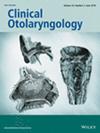Treatment Outcomes of Intralesional Steroid Injection for Refractory Vocal Process Granuloma
Abstract
Objectives
Vocal process granuloma (VPG) is a chronic condition resulting from a mucoperichondrial injury of vocal process. Initial conservative treatment typically involves vocal hygiene education and antireflux medication. Treatment challenges arise with refractory cases. Outcomes of second-line treatments such as surgical excision and botulinum toxin injections remain inconsistent. Thus, we propose this study to investigate the effectiveness of intralesional steroid injections for refractory VPG.
Methods
We conducted a retrospective review of 23 patients with VPG who showed no improvement after 3 months of proton pump inhibitors. These patients underwent one to three courses of monthly in-office intralesional steroid injections as a second-line therapy. Treatment outcomes were evaluated by measuring the size of the VPG relative to the length of the vocal folds before and after the final injection procedure.
Results
Results showed a significant reduction in VPG size from baseline of 27.74 ± 15.06 to 5.48 ± 8.95 (p < .001). 15 out of 23 patients were responsive (size reduction ≥ 75%) to intralesional steroid injection. Alcohol consumption and longer symptom duration were associated with a poor response (size reduction <75%), whereas prior intubation was associated with better response.
Conclusions
For refractory VPG not responding to conservative treatment, intralesional steroid injection appears to be a promising alternative option without significant adverse effects.

 求助内容:
求助内容: 应助结果提醒方式:
应助结果提醒方式:


